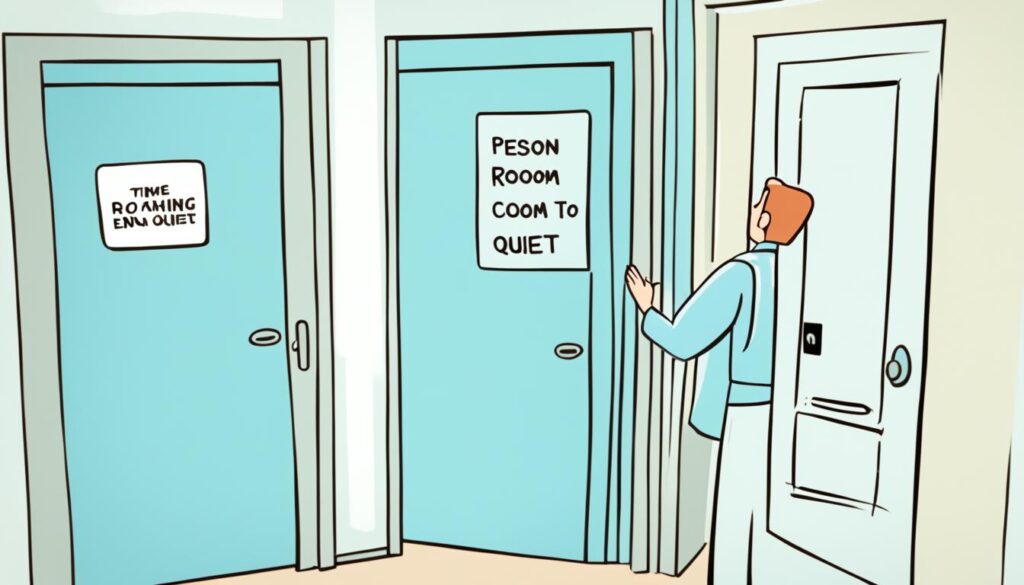Do introverted employees often feel overlooked or misunderstood in the workplace? Are you looking for strategies to better support them and enhance their engagement? Understanding the unique characteristics and communication styles of introverts can be the key to creating a harmonious work environment that benefits all team members. Let’s explore nine effective tactics that HR professionals and managers can utilize to effectively deal with introverted employees, leveraging their strengths and helping them thrive in the workplace.
Key Takeaways:
- Respecting the need for alone time can help introverted employees recharge and feel more productive.
- Offering a private workspace, if possible, can create an environment that aligns with introverts’ preferences for quieter surroundings.
- Effective and compassionate communication is vital when managing introverted employees.
- Finding a balance between individual tasks and group activities allows introverts to contribute comfortably in team settings.
- Expressing sincere appreciation and recognizing introverted employees’ contributions boosts their morale and engagement.
Respect needs for alone time
Introverts have a natural inclination towards solitude and quiet time to recharge their energy. For them, alone time is not just a preference, but a necessary way to rejuvenate and regain focus. As a manager or HR professional, it is important to understand and respect the introverted employees’ need for alone time in order to create a supportive and productive work environment.
Providing opportunities for introverted employees to have alone time can greatly enhance their comfort and productivity. This can be achieved by offering flexible work schedules that allow them to work during their most productive periods, or by creating designated quiet areas where they can retreat and recharge.
Respecting introverted employees’ alone time needs not only improves their well-being, but also helps them thrive in their roles. By honoring their introversion, you create an environment that values their unique strengths and allows them to contribute at their best.
| Benefits of Respecting Alone Time Needs |
|---|
| 1. Increased focus and concentration |
| 2. Improved creativity and problem-solving skills |
| 3. Enhanced productivity and job satisfaction |
| 4. Reduced stress and burnout |
| 5. Better work-life balance |
By acknowledging and accommodating introverted employees’ need for alone time, you create an environment that supports their natural strengths and allows them to recharge, leading to increased engagement and overall job satisfaction.
Offer private workspace if possible
Introverts often work best in a quieter environment with minimal distractions. For introverted employees, having a private workspace can greatly enhance their productivity and overall well-being in the workplace. A private workspace provides them with the opportunity to focus on their tasks without the constant interruptions and noise that can be present in open office settings.
Offering introverted employees a private workspace, if possible, shows that you understand and respect their workspace preferences. It creates an environment that aligns with their need for a quieter and more secluded area to work in. This can significantly contribute to their ability to concentrate, think creatively, and produce high-quality work.

Having a private workspace can also alleviate any self-conscious feelings introverted employees may have about their work habits in comparison to their more extroverted colleagues. It allows them to work in a way that feels comfortable and natural to them, without the pressure of conforming to a more social or collaborative work environment.
By providing introverted employees with a private workspace, you not only accommodate their need for a quieter and more focused atmosphere, but you also create a supportive and inclusive work environment that values individual differences and preferences.
| Benefits of Private Workspace for Introverted Employees |
|---|
| 1. Increased productivity and focus |
| 2. Reduced distractions and interruptions |
| 3. Alleviated self-consciousness |
| 4. Enhanced sense of comfort and well-being |
Remember, not all organizations may have the resources or physical space to provide private workspaces for every employee. In such cases, consider alternative options like designated quiet areas or noise-canceling headphones to create a more conducive workspace for introverted colleagues.
- Designate specific areas where employees can retreat for quiet and focused work
- Provide noise-canceling headphones or white noise machines to create a more peaceful atmosphere
- Encourage introverted employees to communicate their workspace preferences and needs
By offering private workspace or suitable alternatives, you demonstrate your commitment to creating an environment that values and supports the unique needs and preferences of introverted employees.
Communicate needs compassionately
Effective communication is vital when managing introverted employees. It’s important to approach conversations with introverted employees in a compassionate and understanding manner, taking into consideration their preference for less social interaction. By adapting communication styles to suit their needs, you can create a positive and supportive work environment.
“Introverted employees often appreciate direct and thoughtful communication. By providing clear instructions and allowing them time to process information, you can help them feel more comfortable and engaged.”
To effectively communicate with introverted employees, keep the following strategies in mind:
- Avoid misconceptions: Don’t assume that introverted employees are not interested or engaged simply because they are quieter. Recognize their thoughtful and reflective nature.
- Allow for reflection time: Give introverted employees space to gather their thoughts before responding. This allows them to articulate their ideas more effectively.
- Provide written communication when possible: Sharing information in written form allows introverted employees to review and process it at their own pace.
- Use active listening techniques: Demonstrate genuine interest and empathy by actively listening to introverted employees. Maintain eye contact, nod to show understanding, and ask open-ended questions to encourage them to share their thoughts and feelings.
By employing compassionate communication techniques, you can create an environment where introverted employees feel heard, valued, and empowered to contribute their unique perspectives.
Compromise on tasks and meetings
In group settings and meetings, introverted employees may find it challenging to express their thoughts and ideas. Being in a lively group setting with extroverted leaders can sometimes overshadow the contributions of introverts. However, there are ways managers can help introverted employees feel included and valued while also respecting their preference for quieter work environments.
One effective strategy is to find a compromise between individual tasks and group activities. By balancing these two types of work, managers can create an environment where introverts can contribute in a way that feels more comfortable to them. For example, instead of expecting introverted employees to speak up during every meeting, managers can give them the option to contribute their ideas in writing or through smaller group discussions.
This compromise not only allows introverts to express themselves in a way that aligns with their communication style but also ensures that their insights and perspectives are heard. It promotes a more inclusive and collaborative work environment where diverse personalities and working styles can thrive.

Table: Examples of Compromises for Introverted Employees in Tasks and Meetings
| Scenario | Compromise |
|---|---|
| Brainstorming sessions | Provide introverted employees with an opportunity to contribute ideas in writing or through one-on-one discussions with a team leader. |
| Presentation delivery | Allow introverted employees to present their ideas using visual aids or pre-recorded videos. |
| Team discussions | Provide introverted employees with time to reflect and gather their thoughts before engaging in group discussions. |
- Encourage introverted employees to share their perspectives through written reports or emails.
- Organize smaller group discussions or brainstorming sessions to foster a more intimate and inclusive environment.
- Evaluate individuals based on the quality and depth of their contributions, rather than their participation level in large meetings.
By recognizing the importance of compromise and adapting to the needs of introverted employees, managers can create a work environment where everyone can thrive and contribute their best.
Express appreciation sincerely
Expressing appreciation and recognizing the contributions of introverted employees is crucial for boosting their morale and engagement. When introverted employees feel valued, they are more likely to be motivated to continue delivering high-quality work. Managers can show sincere appreciation by providing specific compliments that resonate with introverts’ quieter nature, acknowledging their thoughtfulness, attention to detail, and strategic thinking abilities.
For example, a manager can praise an introverted employee by saying, “I sincerely appreciate your thorough analysis of the project. Your attention to detail and strategic thinking have significantly contributed to our success. Thank you for your valuable insights.”
By expressing sincere appreciation, managers can create a positive work environment that values and embraces the strengths of introverted employees.
| Benefits of expressing sincere appreciation |
|---|
| Boosts employee morale |
| Increases employee engagement |
| Encourages continued high-quality work |
| Enhances team collaboration and cohesion |
- Promotes a positive work environment
- Builds trust and loyalty
- Improves employee satisfaction and retention
Validate contributions and feelings
Validating the contributions and feelings of introverted employees is crucial in creating a supportive and inclusive work environment. By actively listening to introverted employees, acknowledging their ideas, and providing opportunities for them to share their thoughts and concerns, managers can foster empathy and understanding.
This validation not only makes introverted employees feel valued but also encourages them to actively participate in discussions and decision-making processes. It helps build their confidence and contributes to their overall engagement and productivity.

For example, imagine an introverted employee named Lisa who is usually more reserved in team meetings. Her manager, Jane, starts validating Lisa’s contributions by actively seeking her input and recognizing her thoughtful insights. Jane provides opportunities for Lisa to share her thoughts in one-on-one settings or through written communication channels. As a result, Lisa feels more included and appreciated, which boosts her confidence and encourages her to actively contribute her unique perspectives.
It is important to remember that validation should be genuine and sincere. Managers can further demonstrate their empathy by being open-minded, considering different viewpoints, and showing gratitude for the valuable contributions introverted employees bring to the table.
| Benefits of Validating Contributions and Feelings for Introverted Employees |
|---|
| 1. Increases employee engagement and satisfaction |
| 2. Boosts confidence and self-esteem |
| 3. Encourages active participation and idea-sharing |
| 4. Improves teamwork and collaboration |
| 5. Enhances employee loyalty and retention |
Suggest counseling if affecting work
If an introverted employee’s introversion is significantly affecting their work performance or causing them undue stress, it may be beneficial to suggest counseling or other forms of professional assistance. Counseling can provide introverted employees with strategies to effectively manage workplace challenges and stressors, allowing them to thrive in their roles.
HR professionals can provide resources and confidential support to introverted employees who may benefit from additional guidance.
Provide flexibility where reasonable
Offering flexibility in terms of work schedules and assignments can greatly benefit introverted employees. By allowing introverted employees to work during their most productive hours or providing opportunities for remote work, you can help them work within their comfort zones and maximize their productivity. Flexibility enables introverted employees to create an environment that suits their work preferences and allows them to perform at their best.
For example, consider an introverted employee named Sarah who works best in the mornings when her energy levels are high. By offering her a flexible work schedule that allows her to start early and finish early, she can fully utilize her peak concentration and creativity during those hours. This flexibility allows her to stay within her comfort zone and perform tasks more efficiently.
Additionally, providing remote work opportunities can be highly beneficial for introverted employees who prefer a quieter and more independent work environment. Remote work allows them to work from the comfort of their own homes, eliminating distractions and unnecessary social interaction. This flexibility enables introverted employees to focus on their tasks and deliver their best work without feeling overwhelmed or drained by external stimuli.
Managers should consider individual work preferences and find a balance that meets both the needs of the business and the introverted employee. This flexibility shows that you value and respect their work style, creating a positive and supportive work environment where introverted employees can thrive.

| Benefits of flexibility for introverted employees: |
|---|
| Allows introverted employees to work during their most productive hours |
| Provides opportunities for remote work, creating a quieter and more independent work environment |
| Reduces stress and overwhelm by allowing introverted employees to work within their comfort zones |
| Enhances productivity and quality of work by minimizing distractions and unnecessary social interaction |
| Fosters a positive work culture that values individual preferences and promotes employee well-being |
Support professional development
Supporting the professional development of introverted employees is essential for their growth and success within the organization. By providing opportunities for training, mentorship, and career advancement that align with introverted employees’ preferences and strengths, managers can help introverts thrive and reach their full potential.
For example, you can offer training programs that allow introverted employees to develop their skills at their own pace and in a comfortable learning environment. This could include online courses, self-study modules, or workshops that focus on individual growth and development.
In addition to training, mentorship programs can be valuable for introverted employees. Pairing them with experienced mentors who understand their communication style and work preferences can provide guidance, support, and valuable insights into navigating the workplace.
Networking opportunities can also play a crucial role in the professional development of introverts. While they may be more comfortable in smaller, more intimate settings, providing networking events that allow for meaningful connections and relationship-building can help introverted employees expand their professional network.
To further support introverted employees in their professional growth, managers should recognize and value their unique contributions. This can be done through regular feedback and performance evaluations that highlight their specific strengths and achievements. By acknowledging their accomplishments, introverted employees are encouraged to continue taking on new challenges and reaching for career growth opportunities.
FAQ
How can I effectively deal with introverted employees?
To effectively manage introverted employees, it’s important to understand their characteristics and preferences. Respect their need for alone time, offer private workspaces if possible, communicate compassionately, compromise on tasks and meetings, express appreciation sincerely, validate their contributions and feelings, suggest counseling if needed, provide flexibility where reasonable, and support their professional development.
Why is it important to respect introverted employees’ need for alone time?
Introverts tend to recharge by spending time alone, away from social interactions. Respecting their need for alone time and providing opportunities for solitude can help introverted employees feel more comfortable and productive in the workplace.
Should I offer introverted employees a private workspace if possible?
Yes, if possible, offering introverted employees a private workspace can create an environment that aligns with their preferences and allows them to focus on their tasks. It can also help them feel more comfortable and less self-conscious about their work habits compared to their more extroverted colleagues.
How should I communicate with introverted employees?
When communicating with introverted employees, it’s important to approach conversations with compassion and understanding. Avoid misconceptions about introverts and adapt your communication style to suit their needs, taking into consideration their preference for less social interaction.
How can I find a balance between tasks and meetings for introverted employees?
In group settings and meetings, introverted employees may find it challenging to express their thoughts and ideas. To help them, find a compromise between individual tasks and group activities. This allows introverts to contribute in a way that feels more comfortable for them, while still feeling included and valued in team discussions.
How can I express appreciation to introverted employees?
Expressing appreciation and recognizing the contributions of introverted employees is crucial for boosting their morale and engagement. Provide genuine and specific compliments that resonate with their quieter nature, acknowledging their thoughtfulness, attention to detail, and strategic thinking abilities.
How can I validate the contributions and feelings of introverted employees?
Validating the contributions and feelings of introverted employees is important for creating a supportive and inclusive work environment. Actively listen to introverted employees, acknowledge their ideas, and provide opportunities for them to share their thoughts and concerns. This validation encourages introverted employees to actively participate in discussions and decision-making processes.
When should I suggest counseling for introverted employees?
If an introverted employee’s introversion significantly affects their work performance or causes undue stress, it may be beneficial to suggest counseling or other forms of professional assistance. Counseling can provide strategies to effectively manage workplace challenges and stressors, allowing introverted employees to thrive in their roles.
How can flexibility benefit introverted employees?
Offering flexibility in terms of work schedules and assignments can greatly benefit introverted employees. Allowing them to work during their most productive hours or providing opportunities for remote work helps them work within their comfort zones and maximize their productivity.
How can I support the professional development of introverted employees?
Supporting the professional development of introverted employees is crucial for their growth and success. Provide opportunities for training, mentorship, and career advancement that align with their preferences and strengths. Recognizing and valuing their unique contributions will help them thrive and reach their full potential.